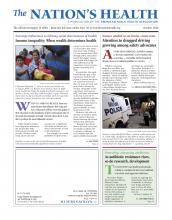Select agent program issues first report
The great majority of labs that work with potentially dangerous and deadly pathogens experienced no problems or mishaps in 2015, according to the first report of the Federal Select Agent Program, which regulates the possession, use and transfer of certain biological and toxic agents.
By the end of 2015, 291 entities were registered with the program, with the majority hailing from academia, stated the report, which was released in June. In 2015, the program conducted more than 200 inspections and was notified of nearly 200 incidents resulting in potential occupational exposures. As a result of such potential exposures, the program monitored more than 900 lab workers, none of whom developed an illness or transmitted a virus to others.
During the year, 12 reports of losses were received, though all were the result of record-keeping errors or of a sample being mistakenly destroyed. Overall in 2015, six entities agreed to take corrective action, three were put under suspension and 16 were referred to the FBI, though no criminal intent was discovered.
The Federal Select Agent Program is jointly managed by divisions within the Centers for Disease Control and Prevention and the U.S. Department of Agriculture.
For more information on “2015 Annual Report of the Federal Select Agent Program,” visit www.selectagents.gov.
Car-sharing services can reduce air pollutants
Car sharing has the potential to reduce overall driving as well as greenhouse gas emissions, according to a July report from the Transportation Sustainability Research Center at the University of California-Berkeley.
In a one-way car-sharing impact analysis, researchers examined the effects of Car2go, the largest car-sharing operator in the world that allows users to begin and end a trip at different locations. Researchers found that in five cities across the U.S. and Canada, Car2go allowed some users to get rid of their car altogether or simply forgo buying a car. Overall, Car2go removed between seven and 11 vehicles from the road per vehicle across the five cities, which translates into 28,000 fewer vehicles on the road.
The report also estimated that between 20 million and 37.5 million miles driven were eliminated due to Car2go across the five cities studied, as well as up to 10,000 metric tons of greenhouse gases per year.
For more information on “Impacts of Car2go on Vehicle Ownership, Modal Shift, Vehicle Miles Traveled and Greenhouse Gas Emissions: An Analysis of Five North American Cities,” visit http://tsrc.berkeley.edu.
- Copyright The Nation’s Health, American Public Health Association









